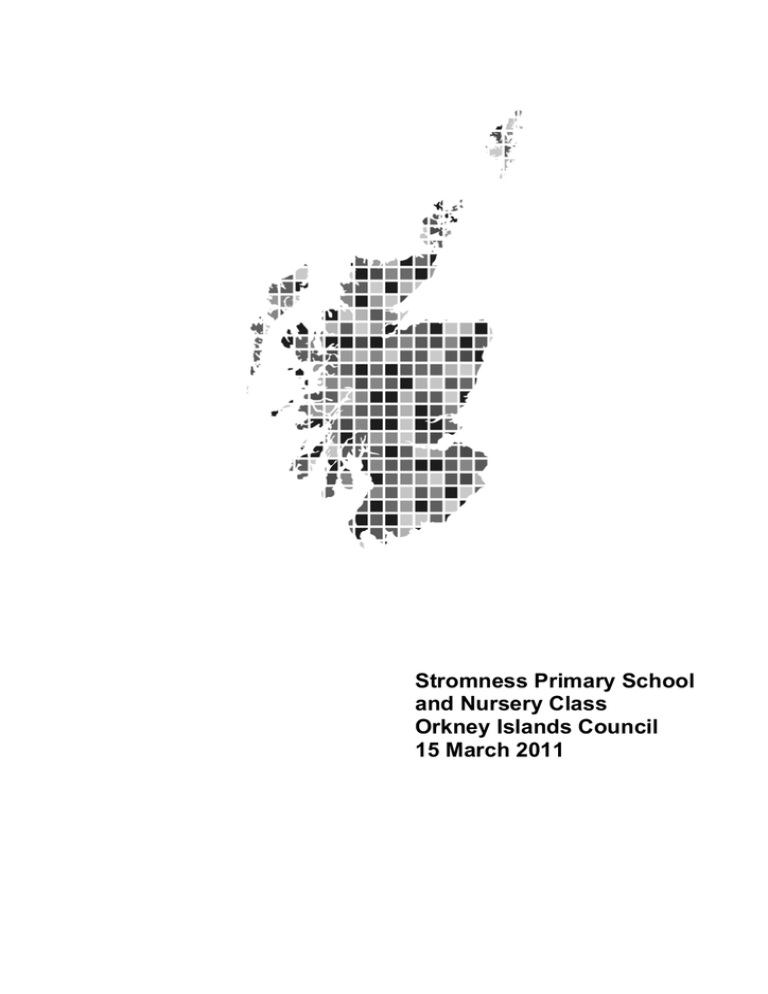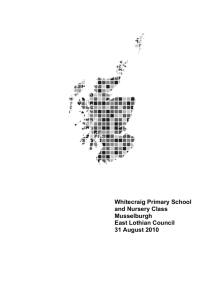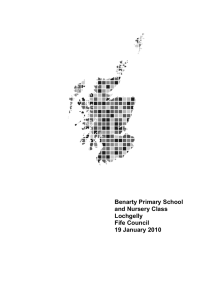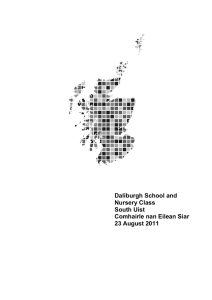Stromness Primary School and Nursery Class Orkney Islands Council
advertisement

Stromness Primary School and Nursery Class Orkney Islands Council 15 March 2011 HM Inspectorate of Education (HMIE) inspects schools in order to let parents1, children and the local community know whether their school2 provides a good education. Inspectors also discuss with school staff how they can improve the quality of education. At the beginning of the inspection, we ask the headteacher and staff about the strengths of the school, what needs to improve, and how they know. We use the information they give us to help us plan what we are going to look at. During the inspection, we go into classes and join other activities in which children are involved. We also gather the views of children, parents, staff and members of the local community. We find their views very helpful and use them together with the other information we have collected to arrive at our view of the quality of education. This report tells you what we found during the inspection and the quality of education in the school. We describe how well children are doing, how good the school is at helping them to learn and how well it cares for them. We comment on how well staff, parents and children work together and how they go about improving the school. We also comment on how well the school works with other groups in the community, including services which support children. Finally, we focus on how well the school is led and how staff help the school achieve its aims. If you would like to learn more about our inspection of the school, please visit www.hmie.gov.uk. Here you can find analyses of questionnaire returns from children, parents and staff. We will not provide questionnaire analyses where the numbers of returns are so small that they could identify individuals. 1 Throughout this report, the term ‘parents’ should be taken to include foster carers, residential care staff and carers who are relatives or friends. 2 The term ‘school’ includes the nursery class or classes where appropriate. Contents 1. The school 2. Particular strengths of the school 3. How well do children learn and achieve? 4. How well do staff work with others to support children’s learning? 5. Are staff and children actively involved in improving their school community? 6. Does the school have high expectations of all children? 7. Does the school have a clear sense of direction? 8. What happens next? 1. The school Stromness Primary School is a non-denominational school with a nursery class. It serves the town of Stromness and the surrounding area. The roll was 191, including 45 in the nursery, when the inspection was carried out in January 2011. Children’s attendance was in line with the national average in 2009/2010. The school has recently experienced a period of staffing changes. 1 2. Particular strengths of the school • Children’s learning experiences in the nursery. • Children who are polite and well-behaved. • Improved approaches to celebrating children’s achievements. 3. How well do children learn and achieve? Learning and achievement In the nursery, children are forming positive relationships with staff and each other. Children who are new to the nursery are settling well. Children are motivated and enthusiastic about their learning. They approach activities confidently. Children select independently from a wide range of resources. They make decisions readily about what they are learning. Across the primary stages, almost all children enjoy learning and believe school is helping them become more confident. Most children are motivated and keen to learn. They respond positively to opportunities to work together in pairs and small groups. Children’s skills as independent learners are not developed well enough. They do not have enough responsibility to organise and take forward their own learning. In writing, children are becoming more experienced in assessing their own work and the work of others. This is helping them gain an understanding of how to improve their work. Across other areas of the curriculum, children do not always receive high-quality comments about their work to help them know what they are good at and what they need to do to improve their learning. In the nursery, children gain confidence and experience success through taking part in enterprise activities. They enjoy energetic play outdoors and are developing their physical skills well. Children are becoming increasingly aware of how to keep themselves healthy, 2 including through preparing their snack. Across the primary stages, children talk enthusiastically about their achievements. Those in P6 and P7 develop their personal and social skills well during residential outings. Children achieve success in a range of sporting activities, including swimming, football and netball. At the upper stages, children develop their confidence in presenting to an audience. For example, children in P7 led the school assembly about Remembrance Day. In the nursery, children are making very good progress in their learning. In early language, most children listen well in group situations and can follow simple instructions. Most recognise their name in print. A few children show an interest in early writing, including when they write the menu for snack. In early mathematics, most older children recognise numbers beyond ten. They are developing an understanding of mathematical language and use it appropriately during play activities. Across the primary stages, children are making satisfactory progress in English language and mathematics. Most children achieve appropriate national levels of attainment in reading. The majority do so in writing and mathematics. Children’s skills in listening and talking are well developed. They read aloud fluently and with expression. At the upper stages, children talk well about their favourite author. Their skills in interpreting information from non-fiction texts are not secure. Following a decline in attainment in writing, the school has introduced a new writing programme. This is beginning to have a positive effect on improving children’s progress. Children now write for a range of purposes, including real-life contexts. For example, children at the upper stages wrote a script in Orcadian for the Christmas concert. In mathematics, children are developing their accuracy when completing written calculations involving number, money and measurement. For example, at the early stages, children have a sound understanding of measuring the length of objects using non-standard units. Children are developing their skills well in making mental calculations involving multiplication facts. Across the school, children have a good awareness of a variety of two-dimensional shapes and three-dimensional objects. Children in P6 carry out surveys and make good use of graphs to display information. Overall, children’s progress varies as they move through the school. 3 Curriculum and meeting learning needs Children experience a broad curriculum. Staff are reviewing the curriculum to take account of the principles of Curriculum for Excellence. They are developing their confidence in working with the experiences and outcomes in a variety of curricular areas. In the nursery, staff use learning stories effectively to plan children’s learning. They provide a range of opportunities for children to use information and communications technology. Across the primary stages, staff have started to make learning more meaningful for children. They are beginning to plan ways for children to develop their literacy and numeracy skills across aspects of their learning. Visiting specialist teachers in music, drama and physical education enhance children’s learning. Staff now plan ways for children to develop their skills in writing more effectively. Some aspects of the curriculum, such as science and social studies, do not develop children’s skills well enough. All children do not yet benefit from two hours of high-quality physical education each week. The school has improved arrangements for supporting children requiring help with their learning. Staff are more confident in identifying what help children with additional support needs require. Parents and children are becoming more involved in discussing and reviewing learning targets in support plans. Staff should continue with plans to put in place appropriate additional support plans for children requiring help with their learning. In the nursery, staff know children very well. They plan activities at the right level of difficulty for children. Staff use questioning and discussion very well to help support children’s learning. Across the primary stages, tasks are not sufficiently well matched to the different learning needs of children. Teachers do not always take enough account of what children already know when planning activities. The support for learning teacher gives effective support to individuals and groups of children. She provides helpful advice to staff. In some classes, children receive regular and interesting homework to support their learning. 4 4. How well do staff work with others to support children’s learning? In the nursery, staff engage with parents well. A few parents take part in nursery activities and share their skills to enhance children’s learning. Across the primary stages, almost all parents are happy with the school. Most believe the school asks for their opinions. A few parents feel the school could take more account of their views. The school works well with the Parent Council, which is active and supportive. Recently the Parent Council has been involved in taking forward the planning for a new school building. The school has reviewed ways to talk to parents about their child’s learning, including introducing an additional parents’ evening in May of each year. As a result, almost all parents feel they are well informed about their child’s progress. The school has appropriate procedures for responding to any concerns or complaints from parents. Children benefit from positive links with Stromness Academy to help those in P7 prepare for moving to secondary school. 5. Are staff and children actively involved in improving their school community? Children are keen to take responsibilities, including as part of the pupil council. The school has recently set up an eco committee as a way to help children have a greater say in making improvements to the school. Children are not involved enough in making decisions about their learning or school life. The headteacher has improved approaches to monitoring and evaluating the work of the school. These approaches have a clear focus on improving learning and teaching. As part of this, the headteacher observes learning and teaching in classrooms and gives staff helpful comments about ways to improve children’s learning experiences. Teachers discuss with each other how to improve aspects of the curriculum, including writing. They are beginning to reflect more about learning and teaching in their classrooms. Overall, approaches to self-evaluation have not yet had enough impact on improving learning, teaching and achievement. 5 Staff now need to become more involved in improving children’s learning experiences and, in doing so, have regular opportunities to talk and reflect as a team on improving the work of the school. 6. Does the school have high expectations of all children? Children are welcoming and proud of their school. They are well behaved and support each other well. Staff have introduced individual achievement books for children to record their successes both within and outwith the school. These approaches are helping children to recognise, share and celebrate their achievements with each other. Children are developing their understanding of equality and diversity. They gain an awareness of the beliefs and customs of others as part of the programme for religious and moral education. The school does not have appropriate arrangements in place for religious observance. Staff have received training in safeguarding and are aware of their roles and responsibilities in relation to child protection. All staff do not have positive working relationships with each other. As a result, they do not promote a culture of mutual respect successfully. 7. Does the school have a clear sense of direction? The headteacher is caring and committed to the school community. Together with staff, parents and children she has reviewed the school’s vision, values and aims. The headteacher has an accurate view of what the school needs to do to improve. She now needs to take a stronger lead and provide staff with clear guidance on taking areas of improvement forward. Teachers are beginning to take responsibility for aspects of school improvement through participating in working parties as part of the school improvement plan. Working together, the management team and staff now need to improve teamwork and leadership for learning across the school. The school and the education authority need to continue to work closely together to ensure the identified areas for improvement are addressed. 6 8. What happens next? We will carry out a follow-through inspection visit within one year of publication of this report and will report to parents on the extent to which the school has improved. Following that visit, we may continue to check the improvements the school has made. We may also carry out a second follow-through inspection within two years of the original inspection report. If a second follow-through inspection visit is necessary then it will result in another report to parents on the extent of improvement that the school has made. We have agreed the following areas for improvement with the school and education authority. • Improve working relationships, teamwork and leadership for learning at all levels. • Meet children’s learning needs more effectively. • Use approaches to self-evaluation to improve the work of the school and, in doing so, involve staff, parents and children. • Provide regular opportunities for religious observance. At the last Care Commission inspection of the nursery class there were two recommendations made. One of these had been addressed. Outstanding issues are carried forward in this report. 7 Quality indicators help schools and nursery classes, education authorities and inspectors to judge what is good and what needs to be improved in the work of a school and a nursery class. You can find these quality indicators in the HMIE publications How good is our school? and The Child at the Centre. Following the inspection of each school, the Scottish Government gathers evaluations of three important quality indicators to keep track of how well all Scottish schools and nursery classes are doing. Here are the evaluations for Stromness Primary School and Nursery Class. Primary school Improvements in performance Learners’ experiences Meeting learning needs satisfactory satisfactory weak Nursery class Improvements in performance Children’s experiences Meeting learning needs good very good good We also evaluated the following aspects of the work of the school and nursery class. The curriculum Improvement through self-evaluation HM Inspector: Janie McManus 15 March 2011 8 satisfactory weak When we write reports, we use the following word scale so that our readers can see clearly what our judgments mean. excellent very good good means means means satisfactory weak unsatisfactory means means means outstanding, sector leading major strengths important strengths with some areas for improvement strengths just outweigh weaknesses important weaknesses major weaknesses If you would like to find out more about our inspections or get an electronic copy of this report, please go to www.hmie.gov.uk. Please contact us if you want to know how to get the report in a different format, for example, in a translation, or if you wish to comment about any aspect of our inspections. You can contact us at HMIEenquiries@hmie.gsi.gov.uk or write to us at BMCT, HM Inspectorate of Education, Denholm House, Almondvale Business Park, Almondvale Way, Livingston EH54 6GA. Text phone users can contact us on 01506 600 236. This is a service for deaf users. Please do not use this number for voice calls as the line will not connect you to a member of staff. You can find our complaints procedure on our website www.hmie.gov.uk or alternatively you can contact our Complaints Manager, at the address above or by telephoning 01506 600259. Where the school has a nursery class, you can contact the Complaints Coordinator, Headquarters, Care Commission, Compass House, Riverside Drive, Dundee DD1 4NY, telephone 0845 603 0890. Crown Copyright 2011 HM Inspectorate of Education






